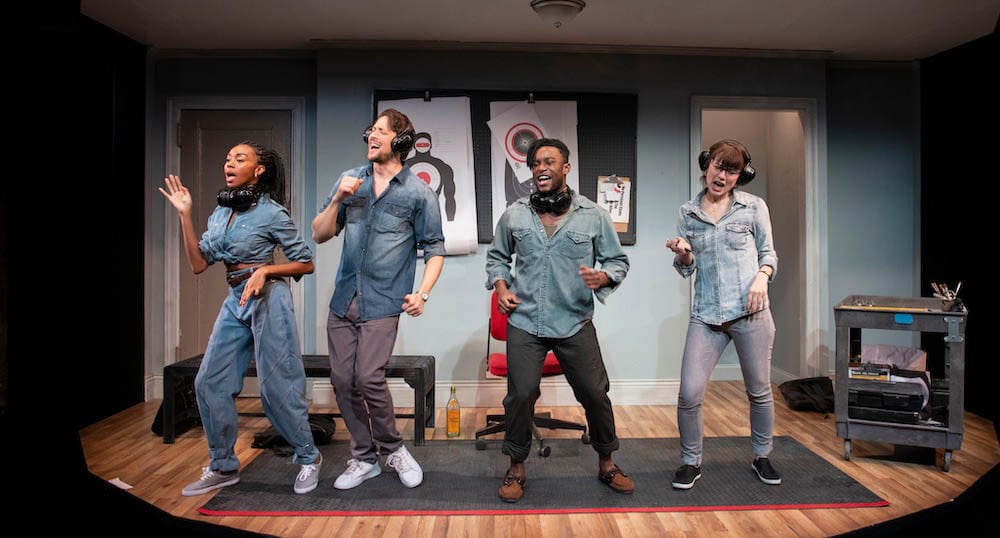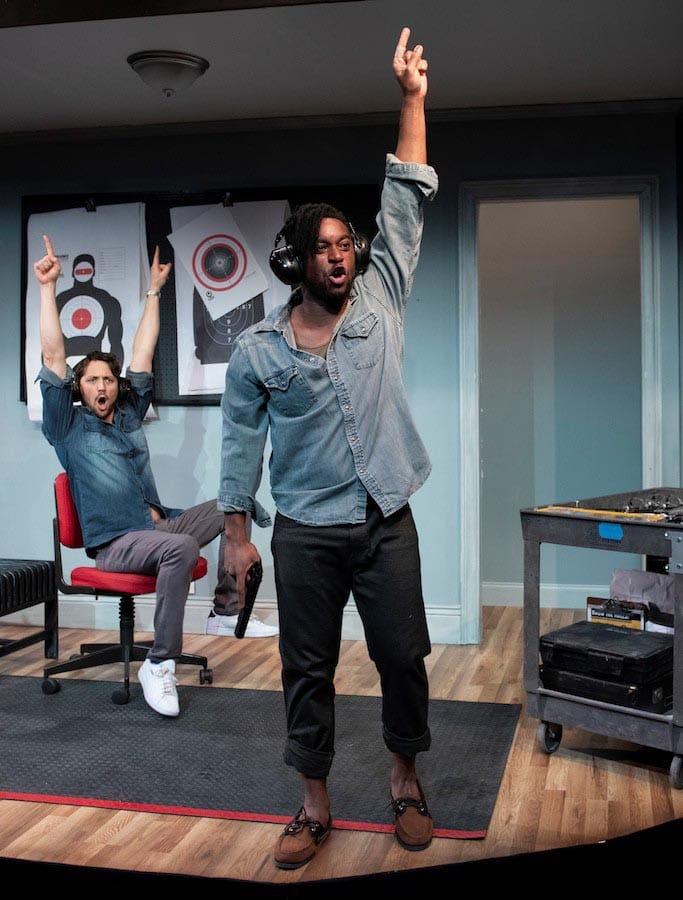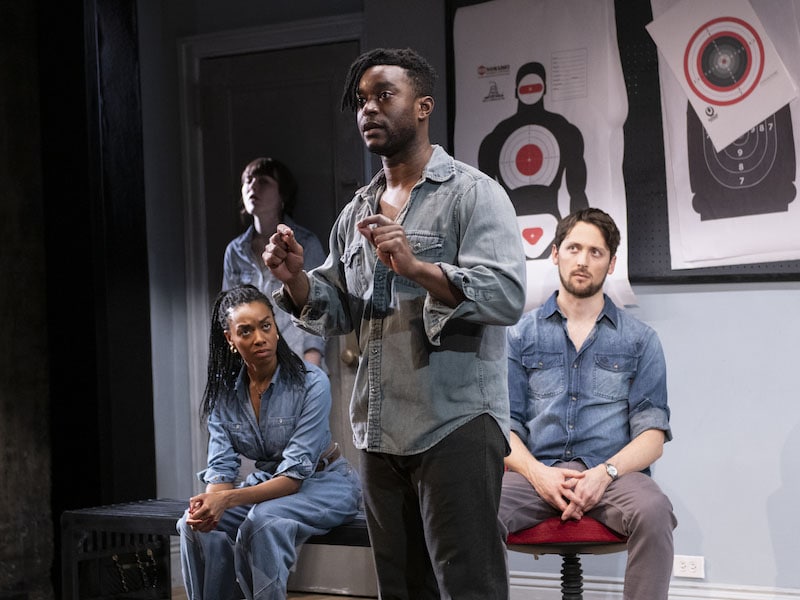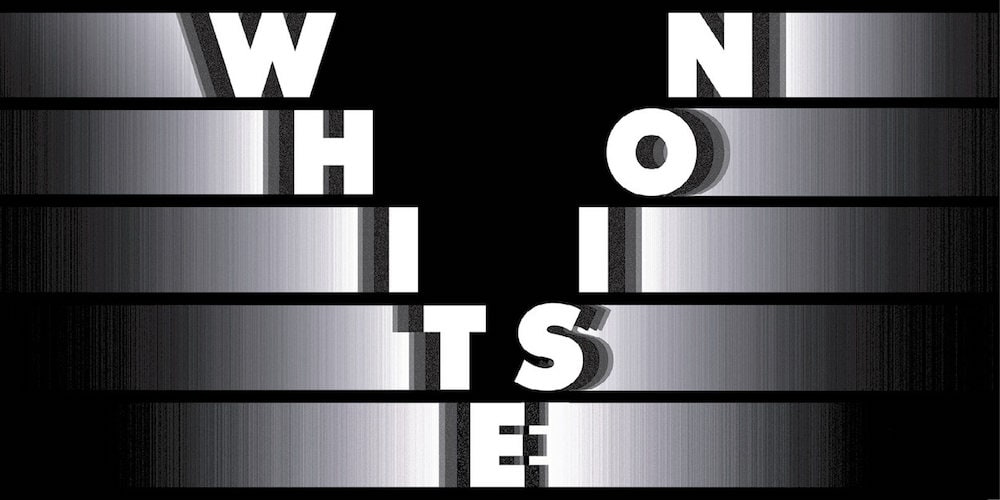Suzan-Lori Parks’s White Noise, just opened in a stunning production at Studio Theatre, is a searing play about the enduring effect of slavery in America — about how, as one character puts it, “all the institutionalized micro-aggressions are still here … mirrored in every single relationship that exists today.” That theme percolates pointedly through a quasi-comedic drama featuring the love lives and career paths of four witty and woke thirtysomethings.

The four are all good buds from college, where they played together in a band and dated as a Black couple and a white couple. They have since mate-swapped (we don’t learn why) and are now adulting as two interracial and aspirationally post-racial couples who evidently revel in each other’s company.
Dawn (who is white) and Leo (Black) live together in a modest, thrift-shop-ish pad. Dawn (Katie Kleiger) is a liberal defense lawyer with a righteous do-gooder streak; Leo (RJ Brown) is a creatively blocked visual artist with severe insomnia.
Misha (who is Black) and Ralph (white) live together in a nicer, pricier, tastefully decorated apartment. Misha (Tatiana Williams) is a vlogger with a popular but as yet unmonetized live call-in show, “Ask a Black”; Ralph (Quinn Franzen), who came into money when his despised dad died, is a blocked writer and part-time college teacher bemoaning his lack of tenure. As the story unfolds, a nifty turntable set takes us back and forth between the two cribs and now and then to, of all places, a gun shooting range (scenic design by Alexander Woodward, lighting design by Alberto Segarra).
That setting figures into the story because in college Leo and Ralph were crack shots on the rifle team, and Ralph inherited his dad’s shooting gallery business, so the convivial foursome frequent it for firing-range recreation. There are thus at times a menacing lot of prop guns onstage and volleys of startling sound-effect gunshots (firearms choreography by Robb Hunter, sound design by Fan Zhang).

But nothing’s so shocking as a moment that comes about two-thirds through. It’s as if time and breath stop. It’s a chilling tableau, an indelible image with a horrific history. Leo and Ralph are alone in the trust-funded apartment. Leo stands on a coffee table wearing a shirt that says SLAVE and around his neck an iron collar with four prongs such as was once used to punish and prevent the escape of actual enslaved Africans. Leo is not play-acting. This is not an S&M scene. It’s no joke. Leo is doing as he was ordered by Ralph, his master and overlord at the moment, and Leo is dissolving in agony.
I disclose that incredibly disturbing moment because it is key to what must be taken seriously about this profoundly disruptive play. How Parks leads up to that moment, delivers it, then lays bare what happens afterward is both unsettling and sheer genius. The actors’ performances, the characters’ interplay, the language ploys, the race-and-gender undertones that roll like thunder — White Noise catches us at each twist and unearths some serious post-slavery shit.
From the beginning, despite each respective interracial couple’s best intentions and love for each other, little racial innuendos keep creeping in. Quick apologies follow. These white characters, after all, have put work into being woke. And yet, and yet … little whispers of absent-minded white entitlement become the background drone of their lives.

The cast (costumed ingeniously with a nod to history by Dominque Fawn Hill) is superb. Each actor finds his or her character’s emotional truth even at points that could seem an offense or a plausibility stretch. Of the four, Leo has the most challenging character arc, and Brown is magnetic as he takes us steadily and credibly from Leo’s engaging opening monolog (in which he explains that his good friend Ralph gave him a white noise machine to help him sleep) to the pained depths of his demeaning. Ralph, on the other hand, has the Q Score hurdle that he turns into the bad white guy before our eyes; yet remarkably Franzen finds such blistering self-honesty in Ralph that the character comes to qualify for a modicum of regard. Dawn and Misha as written function as in-house ego support systems for these two fundamentally dependent men (Misha calls Ralph her “knight in shining armor” no fewer than three times). But in Kleiger’s and Williams’s fine, fierce, and fascinating performances, these two women emerge fully self-possessed.
Reginald L. Douglas’s unerringly truth-seeking direction deserves enormous praise, but I particularly must mention the familiar ease he has had the actors have with one another (including in bold intimacy choreographed by Chelsea Pace). This eloquent physicalization of the four characters’ long-term social, romantic, and sexual bonds makes the eventual rending of their relationships over race all the more devastating.
White Noise at Studio Theater is a shock to the system and necessary to be seen. It is as if Suzan-Lori Parks scalds and skins the body politic in one fell swoop. Even as the plot calls for suspension of disbelief (and name a great play whose storyline doesn’t), Parks’s script persists in deciphering what’s still implicit in the soporific noise of whiteness that hisses and whispers without ceasing.
Running Time: Two hours and 30 minutes including a 15-minute intermission.
White Noise plays through February 20, 2022, at Studio Theatre’s Milton Theatre, 1501 14th Street NW, Washington, DC. Tickets start at $65, with low-cost options and discounts available, and can be purchased online or by calling (202) 332-3300.
COVID Safety: Proof of vaccination (or a negative COVID test) and facemask are required. Studio Theatre’s complete Health and Safety protocols are here.
SEE ALSO:
Studio Theatre to stage eclectic five-play season in revamped building






